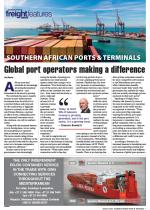Only one southern African port – Port Elizabeth – moved up in the rankings of the World Bank’s Container Port Performance Index (CPPI) from 2020 to 2021.Port Elizabeth’s ranking rose 36 places, from 348 to 312.CPPI calculations are based on the total time spent in port by a vessel.It is compiled by the World Bank, with contributions from S&P Global Market Intelligence.In 2021 the CPPI measured 370 world ports, which had to work on a minimum of 20 calls a year.One hundred and forty-nine ports improved their rankings in CPPI 2021, compared to CPPI 2020, with some of the largest improvers increasing their ranking by over 200 positions.By contrast, the ranking of 182 ports fell in the CPPI 2021.Beira remained the top-ranking port in southern Africa, ranked 270th – two down from its previous score of 268.The biggest drop in ranking was Dar es Salaam, which was down 37 places, or 10%.Next was Maputo at -22 places, followed by Walvis Bay on -21.Worst-performing portsThe worst-performing ports in the region are Ngqura, Durban, Cape Town and Luanda, which occupy consecutive spots from 363 to 366.According to the World Bank, the “CPPI is intended to serve as a key reference point for stakeholders in the global economy, including national governments, port authorities and operators, development agencies, supranational organisations, various maritime interests, and other public and private stakeholders in trade, logistic, and supply chain services”.It draws a direct correlation between the efficiency of container ports and economic growth.“The growth of containerisation has led to vast changes in where and how goods are manufactured and processed, a process that continues to evolve.“Container ports, accordingly, are critical nodes in global supply chains and central to the growth strategies of many emerging economies.“In many cases, the development of high-quality container port infrastructure, operated efficiently, has been a prerequisite to successful export-led growth strategies. It can facilitate investment in production and distribution systems, supporting the expansion of manufacturing and logistics, creating employment, and raising income levels.”Impact on landlocked countriesSouthern Africa’s port performance is also affecting the economic prospects of the seven landlocked countries, which include the Democratic Republic of Congo, as it relies on ports other than Matadi.“Poor performance can also have an impact far beyond the hinterland of a port: Container shipping services are operated on fixed schedules with vessel turnaround at each of the ports of call on the route planned within the allocated time for port stay.Inhibiting economic growth“Poor performance at one port on the route could disrupt the entire schedule. The result far too often is that instead of facilitating trade, the port increases the cost of imports and exports, reduces the competitiveness of its host country and its hinterland, and inhibits economic growth and poverty reduction.“These impacts can be particularly pronounced for landlocked developing countries and the small island developing states,” the report states.Another factor increasing the cost of doing business in southern Africa is the size of the vessels calling.According to the report, the vessels calling on African ports fall mainly in the 1 500- to 5 000-TEU range.There is, however, a shift to 5 000- to 8 500-TEU vessels where the ports have sufficient draught and handling equipment.Larger vessels are not calling on Africa.The two top-ranked container ports in the CPPI 2021 are King Abdullah Port (Saudi Arabia) in first place, followed by the Port of Salalah (Oman)

